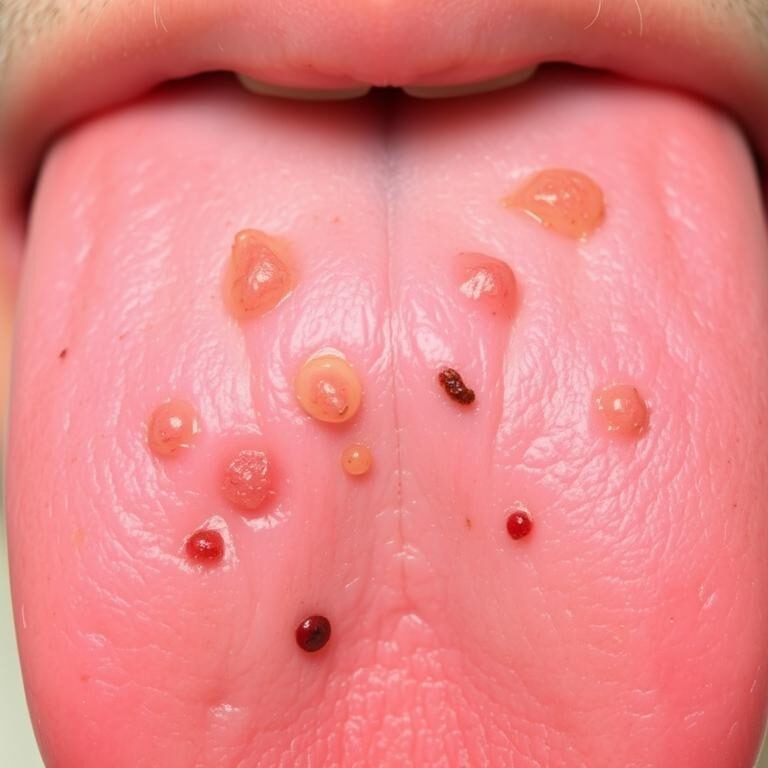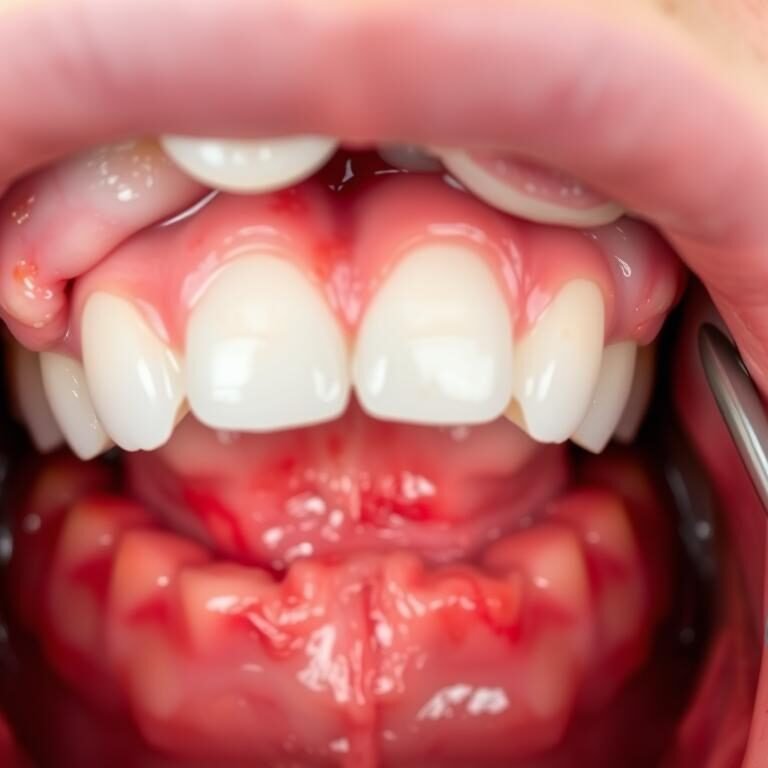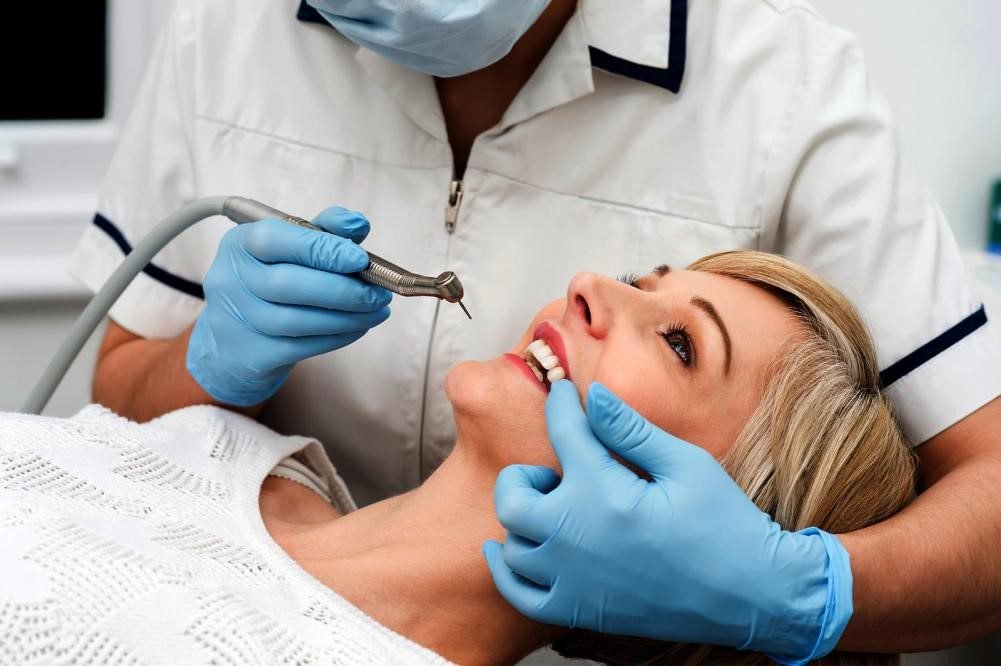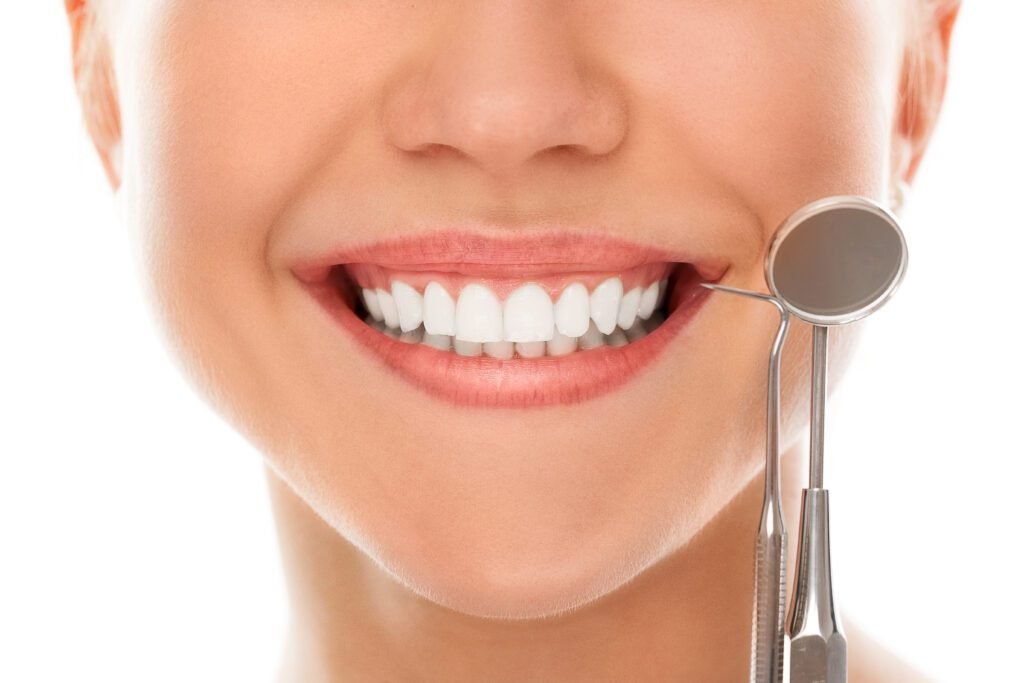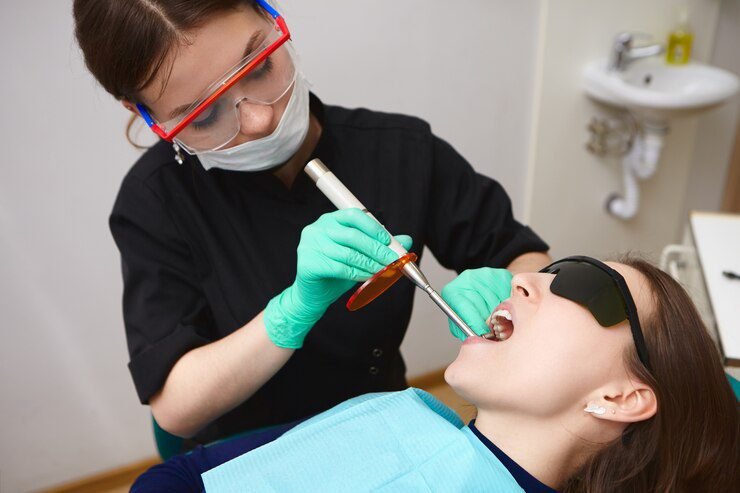Table of Contents
What is Burning Mouth Syndrome?
Burning Mouth Syndrome (BMS) is a complex and enigmatic condition characterized by a burning or scalding sensation in the mouth without any apparent cause or physical abnormalities. This condition primarily affects the tongue, lips, gums, roof of the mouth, and the inside of the cheeks. BMS can occur suddenly or develop gradually, and it may persist for months or even years.
Individuals affected by Burning Mouth Syndrome often experience discomfort and pain which can significantly impact their quality of life. The intensity of the burning sensation can vary from person to person, ranging from mild discomfort to severe pain that interferes with eating, speaking, and performing daily activities. Unfortunately, there isn’t a specific test to diagnose Burning Mouth Syndrome, and the exact cause remains unknown. However, various factors such as underlying medical conditions, nerve damage, hormonal imbalances, and psychological factors have been proposed as possible contributors to the development of this condition.
In the next section, we will delve deeper into the prevalence of Burning Mouth Syndrome, exploring the demographics and groups of individuals most commonly affected by this condition. Additionally, we will discuss the array of symptoms experienced by those with BMS, as well as the primary and secondary causes that have been identified through extensive research and clinical studies.

Prevalence of Burning Mouth Syndrome
Burning Mouth Syndrome (BMS) is a complex and often misunderstood condition that affects a significant portion of the population. Although its exact prevalence is difficult to determine, studies suggest that BMS affects approximately 1-5% of adults worldwide. The condition is more commonly observed in postmenopausal women, with the female-to-male ratio being 7:1.
Despite the relatively low prevalence rates, it is important to highlight the widespread impact of BMS on individuals’ quality of life. The chronic burning sensation and discomfort experienced by those with BMS can significantly interfere with daily activities, such as eating, speaking, and even sleeping. Furthermore, the emotional and psychological toll cannot be overlooked, as the constant pain can cause anxiety, depression, and social isolation. Recognizing the prevalence of BMS and its far-reaching consequences highlights the urgent need for improved understanding, accurate diagnosis, and effective management strategies for individuals affected by this challenging condition.
Symptoms of Burning Mouth Syndrome
Burning Mouth Syndrome (BMS) is a distressing condition characterized by a burning sensation in the mouth without any visible oral abnormalities. Individuals experiencing BMS often describe the feeling as a scalding or tingling sensation that affects various parts of the mouth, such as the lips, tongue, gums, and palate. The discomfort may range from mild to severe and can persist for months or even years.
In addition to the burning sensation, individuals with BMS may also experience other oral symptoms. These can include dry mouth, altered taste sensation (such as a metallic or bitter taste), a feeling of numbness or loss of sensation in the mouth, and an increased sensitivity to spicy or acidic foods. It is important to note that the symptoms of BMS can vary from person to person, and some individuals may only experience a few of these symptoms while others may experience several simultaneously.
It is crucial for individuals experiencing any of these symptoms to seek professional dental or medical assessment, as proper diagnosis and management are key to alleviating the discomfort and improving overall oral health.
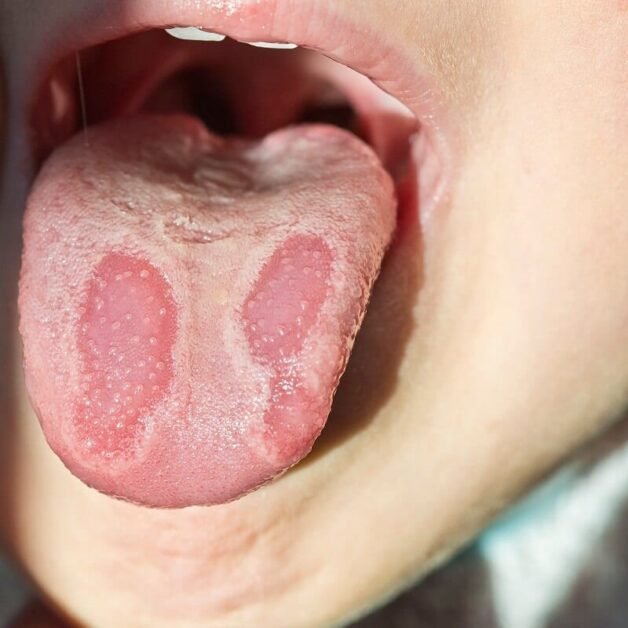
Primary Causes of Burning Mouth Syndrome
Primary Causes of Burning Mouth Syndrome
Burning mouth syndrome (BMS) is a perplexing condition that has puzzled both patients and healthcare professionals alike. While the exact cause of BMS remains unknown, researchers have identified several primary factors that may contribute to its development.
One of the primary causes of BMS is believed to be oral neuropathy, which refers to damage or dysfunction of the nerves that supply the mouth. This can result in altered sensory perception, leading to a burning sensation. Other possible causes include hormonal imbalances, such as menopause or thyroid dysfunction, as well as nutritional deficiencies, particularly in vitamin B12 and iron.
Furthermore, psychological factors, such as anxiety, depression, and stress, have also been linked to the onset of burning mouth syndrome. It is thought that these emotional disturbances may affect the function of the central nervous system, ultimately triggering the unpleasant symptoms experienced by individuals with BMS.
While these primary causes provide some insight into the origins of burning mouth syndrome, it is essential to recognize that each case may be unique. A comprehensive evaluation by a dental professional is crucial in order to determine the underlying cause and develop an appropriate treatment plan.
Secondary Causes of Burning Mouth Syndrome
Secondary causes of burning mouth syndrome refer to the underlying conditions or factors that can contribute to the development or exacerbation of this perplexing condition. While primary causes are related specifically to nerve damage or dysfunction, secondary causes are often associated with various medical, dental, or psychological factors.
One potential secondary cause of burning mouth syndrome is a vitamin deficiency, particularly vitamin B12 or iron deficiency. Studies have shown that individuals with low levels of these nutrients may experience oral symptoms such as burning or dryness. In such cases, addressing the deficiency through appropriate supplementation or dietary modifications may help alleviate burning mouth symptoms.
Another secondary cause of burning mouth syndrome is hormonal changes, particularly in women during menopause. Fluctuating estrogen levels can disrupt the delicate balance of oral tissues, leading to sensations of burning or discomfort. Hormone replacement therapy or other hormonal interventions may be considered to help manage these symptoms.
It is worth noting that secondary causes often interact with the primary causes, making the diagnosis and treatment of burning mouth syndrome a complex process. In order to effectively manage this condition, a comprehensive evaluation by a healthcare professional is vital to identify and address any underlying secondary causes.
Risk Factors for Developing Burning Mouth Syndrome
Risk Factors for Developing Burning Mouth Syndrome
Burning Mouth Syndrome (BMS) is a condition that can affect individuals of all ages, with the exact cause still uncertain. However, there are certain risk factors that have been identified, which may increase the likelihood of developing BMS. Understanding these risk factors can help individuals take proactive measures to reduce their chances of experiencing this discomforting condition.
One of the primary risk factors associated with BMS is hormonal changes. Research suggests that hormonal imbalances, often seen during menopause, can contribute to the development of BMS. Fluctuations in estrogen levels may affect the nerves responsible for sensing taste, leading to the onset of burning sensations in the mouth. Additionally, hormonal changes during puberty and pregnancy have also been linked to an increased risk of BMS.
Another notable risk factor is psychological factors such as anxiety, depression, and stress. Individuals who experience high levels of psychological distress are more likely to develop BMS. The connection between psychological states and BMS is complex and multifaceted, with stress and anxiety potentially playing a role in altering the sensory perception in the mouth. Moreover, research suggests that individuals with a history of psychiatric disorders may be more susceptible to developing BMS.
It is important to note that while these risk factors have been identified, they do not guarantee the development of BMS. Each individual’s experience with burning mouth syndrome can vary, and additional research is needed to fully understand the underlying mechanisms. However, by being aware of these risk factors, individuals can work towards managing them and reducing their chances of developing BMS.
Diagnostic Process for Burning Mouth Syndrome
The diagnostic process for burning mouth syndrome involves a comprehensive evaluation of the patient’s medical and dental history, as well as a thorough examination of the oral cavity. There is no specific test to diagnose this condition, which often makes it challenging for healthcare professionals. However, the careful assessment of the patient’s symptoms and ruling out other possible causes is crucial in reaching a diagnosis.
During the examination, the dentist or healthcare provider will look for signs of oral abnormalities, such as redness or dryness of the oral tissues, changes in the taste buds, or any other visible abnormalities. They will also assess the patient’s medical history, including any underlying health conditions or medication use that may contribute to the symptoms. In some cases, blood tests or imaging studies may be recommended to rule out other possible causes or to identify any underlying factors that may be contributing to the symptoms.
It is important to note that a diagnosis of burning mouth syndrome can be challenging due to the absence of specific diagnostic tests. Therefore, the healthcare provider may refer the patient to a specialist, such as an oral medicine specialist or a dentist with expertise in oral pathology, for further evaluation and to rule out other potential causes. The diagnostic process may involve multiple visits and a collaborative approach to ensure accurate diagnosis and appropriate management of the condition.
| Stage | Description |
|---|---|
| Medical History | Detailed questioning about symptoms, medical history, medications, habits (smoking, alcohol), and other relevant factors. |
| Physical Examination | Examination of oral cavity, tongue, gums, and other relevant areas for signs of inflammation, lesions, or other abnormalities. |
| Laboratory Tests | Blood tests for deficiencies (e.g., iron, vitamin B12, zinc), glucose levels, thyroid function, and other potential contributing factors. |
| Salivary Testing | Analysis of saliva flow and composition to assess for abnormalities or deficiencies. |
| Oral Swabs | Swabs to rule out fungal infections (e.g., candidiasis) or bacterial infections. |
| Imaging Studies | Sometimes, imaging studies like MRI or CT scans may be conducted to rule out structural abnormalities or nerve damage. |
| Referral to Specialists | Referral to specialists like oral medicine specialists, dentists, neurologists, or otolaryngologists for further evaluation if needed. |
| Biopsy | In rare cases, a biopsy of oral tissues may be performed to rule out other conditions or to confirm the diagnosis. |
Complications Associated with Burning Mouth Syndrome
Complications Associated with Burning Mouth Syndrome
Burning mouth syndrome can be a relentless and frustrating condition for those who experience it. Unfortunately, this perplexing disorder can also bring about several complications, which further exacerbate the discomfort and affect the overall quality of life of individuals affected by this condition.
One of the main complications associated with burning mouth syndrome is the development of anxiety and depression. The constant pain and discomfort experienced in the oral cavity can lead to feelings of frustration, helplessness, and even social isolation. In fact, studies have shown that individuals with burning mouth syndrome are at a higher risk of developing anxiety and depression compared to the general population. The psychological distress caused by this condition not only adds to the burden of the symptoms but can also hinder the effectiveness of treatment approaches.
Another complication that may arise from burning mouth syndrome is a reduced ability to enjoy food. The persistent burning sensation and altered taste perception can undermine one’s appetite and pleasure in eating, leading to weight loss and a potential decline in overall nutritional status. Furthermore, individuals may develop an aversion to certain foods, especially those that trigger or exacerbate their symptoms. This limitation in food choices can further complicate the already challenging task of maintaining a balanced diet, potentially leading to nutritional deficiencies and related health issues.
It is imperative for healthcare providers to address the potential complications associated with burning mouth syndrome to facilitate appropriate management strategies and improve the overall well-being of those affected. By recognizing the impact on mental health and nutritional intake, healthcare professionals can complement treatment approaches with psychological support, dietary counseling, and a multidisciplinary approach when necessary.
Treatment Options for Burning Mouth Syndrome
Treatment Options for Burning Mouth Syndrome
When it comes to treating Burning Mouth Syndrome (BMS), there are various options available depending on the specific needs and symptoms of each individual. The aim of treatment is to alleviate the discomfort and manage the underlying causes of this condition.
One common approach is the use of medications. Antidepressants, such as tricyclic antidepressants and selective serotonin reuptake inhibitors (SSRIs), have shown effectiveness in reducing pain and providing relief for individuals with BMS. Additionally, medications like clonazepam, a benzodiazepine, can be prescribed to manage the burning sensation. However, it is crucial to consult with a healthcare professional before starting any medication to determine the most appropriate option for your situation and to ensure proper dosage and monitoring.
In addition to medications, there are also natural remedies that can be considered. These include the use of topical products, such as capsaicin creams, which can provide a soothing effect. Furthermore, incorporating dietary changes, such as avoiding spicy and acidic foods, can help minimize symptoms. It is important to note that while natural remedies may provide relief for some individuals, their efficacy may vary, and it is recommended to consult with a healthcare professional before using them.
Treating BMS may require a multidisciplinary approach, involving the expertise of dentists, physicians, and other healthcare providers. It is essential to seek professional guidance to develop an individualized treatment plan that addresses both the physical and psychological aspects of the condition. Ensuring open communication with your healthcare team will facilitate appropriate management and better outcomes for those dealing with Burning Mouth Syndrome.

Medications for Managing Burning Mouth Syndrome
Medications can play a significant role in managing the symptoms of Burning Mouth Syndrome (BMS). While there is no cure for BMS, certain medications can help alleviate pain and discomfort, allowing individuals to better cope with the condition.
One common medication used for BMS is clonazepam, a medication from the benzodiazepine family. Clonazepam can help reduce or eliminate pain by targeting the neurological aspects of BMS. Additionally, tricyclic antidepressants like amitriptyline have been found to be effective in managing pain associated with BMS. These medications can help regulate neurotransmitters in the brain, providing relief to individuals suffering from this condition.
It is important to consult with a healthcare professional, preferably a dentist or oral specialist, to determine the most appropriate medication for managing BMS symptoms. They will consider factors such as the individual’s medical history, potential drug interactions, and overall health before prescribing any medications. Together with other treatment options and lifestyle modifications, medications can be a valuable tool in managing the symptoms of Burning Mouth Syndrome.
Natural Remedies for Alleviating Burning Mouth Syndrome
Natural remedies can be a helpful adjunct to conventional treatments in alleviating the symptoms of burning mouth syndrome. While there is limited scientific evidence to support their effectiveness, many individuals have reported relief from their symptoms with the use of certain natural remedies. One such remedy is aloe vera gel, which possesses anti-inflammatory and soothing properties. Applying a small amount of aloe vera gel directly to the affected areas of the mouth can provide temporary relief from the burning sensation.
Another natural remedy that may offer relief is the use of chamomile tea rinses. Chamomile has been used for centuries for its anti-inflammatory and calming properties. To create a chamomile rinse, steep a chamomile tea bag in hot water for a few minutes, allow it to cool, and then use the tea as a mouthwash, swishing it around the mouth for a minute or two before spitting it out. This can help to soothe the burning sensation and provide a sense of relief.
While these natural remedies may provide temporary relief for some individuals, it is important to note that they are not a substitute for professional medical advice. It is always best to consult with a healthcare professional to determine the most appropriate course of treatment for burning mouth syndrome.
Lifestyle Changes to Reduce Burning Mouth Syndrome Symptoms
Lifestyle Changes to Reduce Burning Mouth Syndrome Symptoms
In addition to medical interventions, making certain lifestyle modifications can significantly alleviate the symptoms of burning mouth syndrome. One crucial lifestyle change is maintaining optimal oral hygiene. Proper brushing and flossing techniques, along with regular dental visits, help keep the mouth clean and minimize the risk of infection or irritation. Using a soft-bristled toothbrush and a gentle touch while brushing is recommended to avoid further irritation to the oral tissues.
Another lifestyle modification that has shown promise in reducing burning mouth syndrome symptoms is mindful stress management. Stress is believed to be a significant trigger for this condition, and finding healthy coping mechanisms can be beneficial. Engaging in activities such as deep breathing exercises, meditation, yoga, or regular physical exercise can effectively reduce stress levels and may contribute to a decrease in burning mouth symptoms. Additionally, seeking support from friends, family, or professional counselors can provide an outlet for emotional distress related to the condition.
Remember, lifestyle changes are just one aspect of managing burning mouth syndrome symptoms. It is essential to consult with a healthcare professional and develop an individualized treatment plan that incorporates a multidimensional approach to address the underlying causes and provide comprehensive symptom relief.
Psychological Support for Coping with Burning Mouth Syndrome
Psychological support plays a crucial role in helping individuals cope with the challenges posed by Burning Mouth Syndrome (BMS). As BMS can be a chronic condition with no visible physical symptoms, it can often lead to frustration, anxiety, and a sense of isolation for affected individuals. Therefore, it is important to address the psychological impact of BMS and provide supportive interventions to enhance overall well-being.
One aspect of psychological support for BMS includes counseling and psychotherapy. These interventions aim to help individuals explore and manage the emotional distress linked to their condition. By working with a trained professional, individuals can develop coping strategies, reduce anxiety and stress levels, and improve their psychological resilience. In addition, support groups or online forums can provide a platform for individuals to connect with others who share similar experiences and gain support, empathy, and advice from their peers.
Psychological support for coping with BMS not only focuses on the emotional aspects but also recognizes the importance of maintaining a positive outlook on life. Encouraging individuals to engage in activities they enjoy and finding ways to reduce stress can contribute to their overall well-being. Furthermore, healthcare professionals can guide individuals in practicing relaxation techniques, such as deep breathing exercises or mindfulness meditation, which have shown potential in alleviating the symptoms of BMS. A holistic approach that considers both the physical and psychological aspects of BMS can help individuals better manage their condition and improve their quality of life.
Preventive Measures for Burning Mouth Syndrome
Burning Mouth Syndrome (BMS) is a challenging condition to manage, with its elusive etiology and complex symptomatology. While effective treatments exist for alleviating the discomfort associated with BMS, focusing on preventive measures can help individuals reduce the frequency and intensity of symptoms. Adhering to good oral hygiene practices plays a crucial role in maintaining oral health and preventing the onset or exacerbation of BMS. Regular brushing with a soft toothbrush, flossing, and tongue cleaning can help prevent infections and ensure overall oral hygiene. Additionally, avoiding oral irritants such as tobacco, alcohol, and spicy or acidic foods can contribute to the prevention of BMS symptoms.
Maintaining a balanced and nutritious diet is essential for overall health and can help prevent or reduce the severity of BMS. Consuming an adequate amount of vitamins and minerals, especially B vitamins and iron, is crucial as deficiencies in these nutrients have been associated with BMS. Additionally, staying hydrated by drinking sufficient amounts of water throughout the day can help alleviate dry mouth, a common symptom of BMS.
While preventive measures can provide some relief from BMS symptoms, it is important to consult with a healthcare professional to determine the underlying cause and develop a customized treatment plan. By adopting a proactive approach and addressing potential triggers and risk factors, individuals with BMS can take steps towards managing their condition and improving their quality of life.
Alternative Therapies for Burning Mouth Syndrome
Alternative Therapies for Burning Mouth Syndrome:
While conventional treatments such as medications and lifestyle changes can effectively manage the symptoms of burning mouth syndrome, some individuals may seek alternative therapies to complement their treatment plan. It is important to note, however, that evidence supporting the effectiveness of alternative therapies in alleviating burning mouth syndrome symptoms is limited.
One alternative therapy that has gained some attention is acupuncture. Acupuncture involves the insertion of thin needles into specific points on the body to promote healing and alleviate pain. Some studies have suggested that acupuncture may provide relief for burning mouth syndrome symptoms, although more research is needed to establish its efficacy. Additionally, it is important for individuals considering acupuncture to seek treatment from a licensed and experienced practitioner to ensure safety and effectiveness.
| Therapy | Description |
|---|---|
| Acupuncture | Involves the insertion of thin needles into specific points on the body to alleviate pain and restore energy balance. |
| Herbal Remedies | The use of herbs like chamomile, peppermint, and aloe vera for their potential soothing and anti-inflammatory properties. |
| Nutritional Therapy | Incorporating specific nutrients such as B vitamins, iron, zinc, and folate to address any deficiencies that may contribute to BMS. |
| Meditation | Mindfulness techniques and meditation to manage stress and anxiety, which can exacerbate BMS symptoms. |
| Aromatherapy | The use of essential oils like lavender, peppermint, or chamomile to reduce stress and promote relaxation. |
| Hypnotherapy | Hypnosis sessions aimed at reducing pain perception and managing stress associated with BMS. |
| Yoga | Practicing yoga postures, breathing exercises, and meditation to alleviate stress and promote overall well-being. |
Outlook and Prognosis for Individuals with Burning Mouth Syndrome
As a dentist with expertise in oral health, I understand the concerns and uncertainties that individuals with Burning Mouth Syndrome may have about their outlook and prognosis. While the outlook can vary from person to person, it is important to note that Burning Mouth Syndrome is a chronic condition that may persist for months or even years. However, with proper management and treatment, many individuals are able to find relief and improve their quality of life.
The prognosis for individuals with Burning Mouth Syndrome depends on several factors, including the underlying cause, the severity of symptoms, and the effectiveness of treatment. It is essential for individuals to work closely with their healthcare providers to develop an individualized treatment plan that addresses their specific needs and goals. This may involve a combination of medications, natural remedies, lifestyle changes, and psychological support.
It is worth mentioning that managing Burning Mouth Syndrome can be a trial-and-error process, as what works for one individual may not work for another. It is important for individuals to be patient and persistent in finding the right approach for their symptoms. With the guidance of their healthcare team, individuals can explore various treatment options and make adjustments as needed to achieve the best possible outcome.
In the next section, we will delve deeper into the various treatment options available for managing Burning Mouth Syndrome, including medications, natural remedies, lifestyle changes, and psychological support. By understanding the potential avenues for relief and support, individuals can take proactive steps towards improving their overall outlook and prognosis.
What are the primary causes of Burning Mouth Syndrome?
The exact cause of Burning Mouth Syndrome is unknown, but primary causes may include nerve damage, hormonal imbalances, or oral fungal infections.
What are the secondary causes of Burning Mouth Syndrome?
Secondary causes of Burning Mouth Syndrome may include nutritional deficiencies, acid reflux, allergies, certain medications, or psychological factors such as anxiety or depression.
What are the risk factors for developing Burning Mouth Syndrome?
Risk factors for developing Burning Mouth Syndrome may include being female, advancing age, experiencing menopause, having a history of other oral conditions, or having a family history of the syndrome.
How is Burning Mouth Syndrome diagnosed?
The diagnostic process for Burning Mouth Syndrome may involve a thorough medical and dental history review, oral examination, ruling out other possible causes, and sometimes additional tests such as blood tests or a biopsy.
Are there any complications associated with Burning Mouth Syndrome?
While Burning Mouth Syndrome itself does not typically lead to severe complications, it can cause significant discomfort, affect eating habits, lead to sleep disturbances, and contribute to emotional distress or anxiety.
What are the available treatment options for Burning Mouth Syndrome?
Treatment options for Burning Mouth Syndrome may include medications such as topical agents, antidepressants, or anticonvulsants; natural remedies; lifestyle changes; psychological support; or alternative therapies like acupuncture or hypnosis.
Can medications effectively manage Burning Mouth Syndrome symptoms?
Medications can be used to manage Burning Mouth Syndrome symptoms, but the effectiveness may vary depending on the individual. It is important to consult with a healthcare professional to determine the most appropriate medication and dosage.
Are there any natural remedies that can help alleviate Burning Mouth Syndrome?
Some natural remedies that may help alleviate Burning Mouth Syndrome symptoms include rinsing with saltwater, avoiding spicy or acidic foods, staying hydrated, practicing good oral hygiene, or using natural products like aloe vera or chamomile.
What lifestyle changes can reduce Burning Mouth Syndrome symptoms?
Making certain lifestyle changes such as avoiding tobacco and alcohol, reducing stress levels, maintaining a balanced diet, practicing good oral care, and staying hydrated can help reduce Burning Mouth Syndrome symptoms.
Is psychological support available for individuals coping with Burning Mouth Syndrome?
Yes, psychological support in the form of therapy or counseling can be beneficial for individuals coping with Burning Mouth Syndrome, as it can help manage stress, anxiety, and any emotional distress associated with the condition.
Are there any preventive measures for Burning Mouth Syndrome?
While there are no specific preventive measures for Burning Mouth Syndrome, maintaining good oral hygiene, avoiding known triggers, managing stress levels, and seeking early treatment for any oral conditions may help reduce the risk of developing the syndrome.
What alternative therapies are available for individuals with Burning Mouth Syndrome?
Some alternative therapies that may be considered for individuals with Burning Mouth Syndrome include acupuncture, hypnosis, herbal supplements, or biofeedback. It is important to consult with a healthcare professional before trying any alternative therapies.
What is the outlook and prognosis for individuals with Burning Mouth Syndrome?
The outlook and prognosis for individuals with Burning Mouth Syndrome can vary. While some cases may resolve on their own or with treatment, others may experience long-term symptoms. It is important to work closely with healthcare professionals to develop a personalized treatment plan and manage symptoms effectively.






